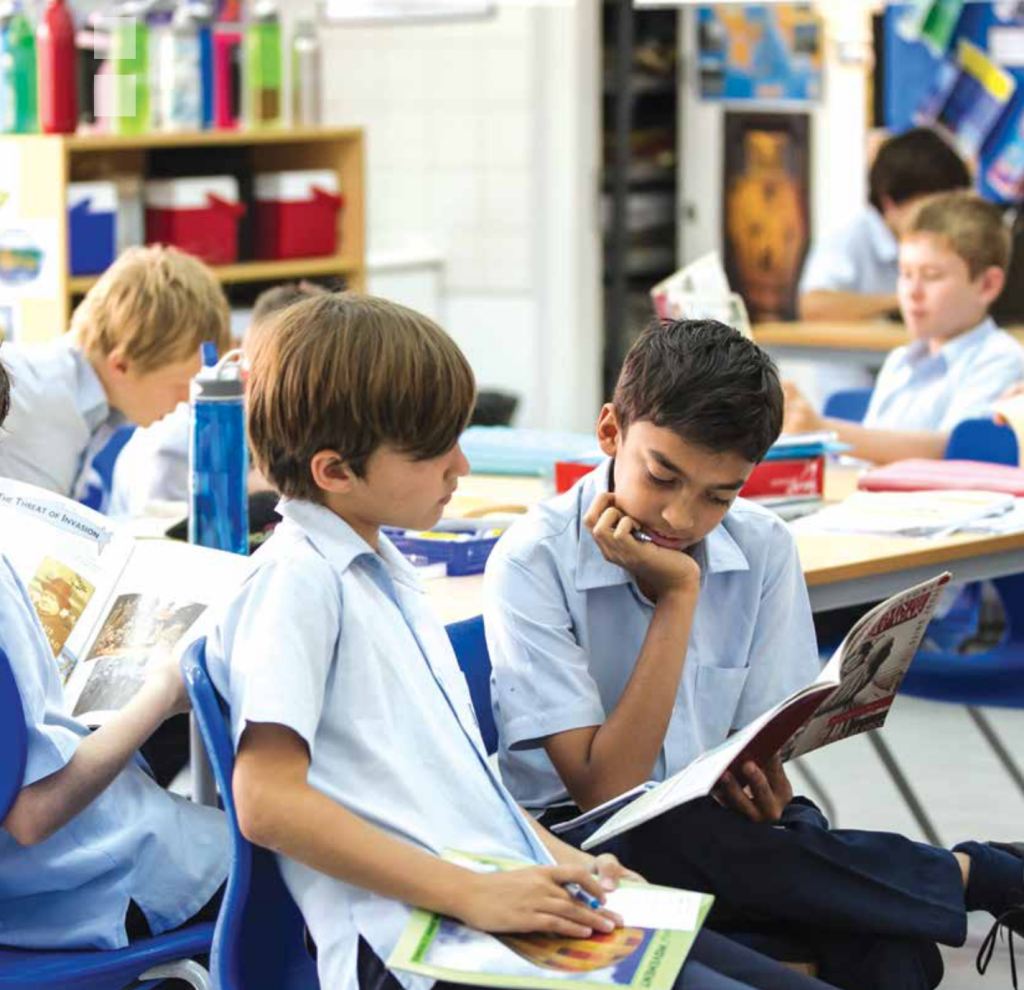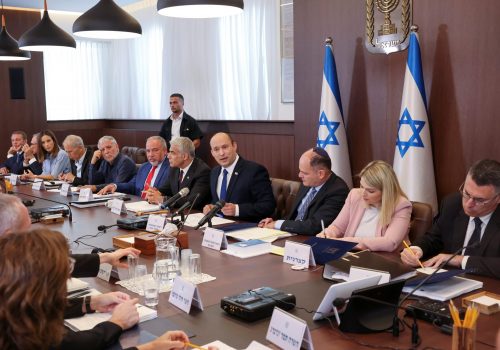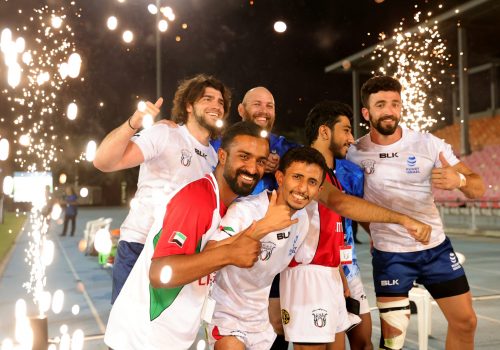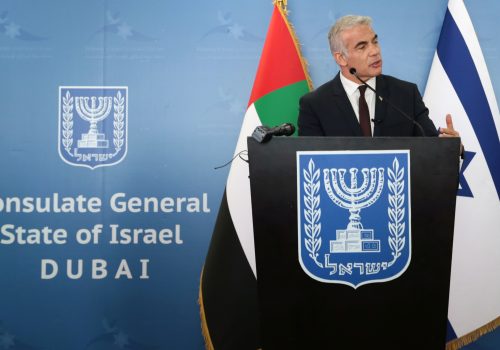The UAE education system is pushing for peace and religious tolerance. The rest of the region should follow suit.
Education is the key to fostering the development of peaceful and tolerant societies. However, it can also be a tool for political and religious radicalization, exploited by bad actors. Education not only reveals what a society believes at present, but also what it aspires to in the future—in other words, they are powerful political predictors. That is why when a country goes to great lengths to teach respect for the “other,” religious tolerance, and peacemaking as a way to resolve conflicts, it should be taken note of.
In this case, that country is the United Arab Emirates (UAE). But what is it exactly that makes the Emirati curriculum so exceptional and how do textbooks affect the prospects of peace in the Middle East?
Universal standardized education is a relatively new phenomenon in the Middle East and North Africa (MENA) and, unlike in the West, curricula in many Arab or Muslim majority countries are written, published, and disseminated directly by the state. Textbooks are already uniquely authoritative, but that is even more the case in the MENA region. Students typically receive one book per subject per semester, which contain both the officially-approved knowledge and exercises students use to study. Recognizing this power, some authorities have weaponized education to foster negative feelings and beliefs about enemies of the state. This can be directed at ethnic minorities, entire religious groups, and countries far beyond their borders.
Historically, a primary target for demonization in the region has, unsurprisingly, been Jews and Israel. Through extreme religious interpretations, historical distortions, and, in some cases, outright conspiracy theories, some MENA countries use curricula to perpetuate broad-based fear and hatred. This deprives their youth of an alternative vision of peace and mutual prosperity.
In 2011, leadership in the UAE became acutely aware of this pattern and cracked down on the radicalism that the Muslim Brotherhood had fomented in the country for many years. Through a process of innovation and transformation beginning in 2016, they took steps to ensure that national education would serve the new Emirati interest.
Well before the signing of the Abraham Accords in 2020—which normalized ties between Israel and the UAE, Bahrain, Morocco, and Sudan—the UAE prepared the groundwork for real peace between peoples by leveraging the power of school textbooks. Students are prepared for a future in which national, ethnic, and religious pride coexists and complements values of openness, diversity, and global citizenship. A new comprehensive study by the Institute for Monitoring Peace and Cultural Tolerance in School Education (IMPACT-se) shows that the Emirati curriculum truly stands at the forefront of teaching these values and others throughout MENA region.
IMPACT-se has been examining school curricula since 1998, using United Nations Educational, Scientific and Cultural Organization (UNESCO)-derived standards as a universal benchmark. After reviewing 220 Emirati school books for grades 1-12 during the 2021-2022 school year, IMPACT-se has yet to see another curriculum that has transformed itself not only to comply with these standards, but to actually prepare its population for a new era of peace and tolerance.
What are students in the UAE learning that is so impressive? At source, the way children are learning is important. Students are taught to value curiosity, dialogue, and critical thinking rather than rote memorization. These values aren’t relegated to application within Emirati society alone. Textbooks convey to students the importance of interacting with people different from themselves, conveying that all people are entitled to respect and dignity, including non-Muslims, non-Arabs, and non-citizens of the UAE. Not only do they teach this as a principle, but they also show how it leads to tangible benefits for both individuals and society at large.
The curriculum also focuses on feelings and experiences that give life meaning: it speaks about a healthy lifestyle, having a positive attitude, and experiencing and sharing happiness with others—including those outside their community—as crucial to living a rich and fulfilled life. Lessons in textbooks praise love, affection, and familial ties with non-Muslims; speak positively about interfaith relations, especially in relation to Christianity; and teach tolerance and acceptance of Judaism. In a welcome change of pace, IMPACT-se’s report didn’t find any examples of anti-Semitism or incitement toward Jews in the Emirati curriculum.
What is truly groundbreaking, however, is how the UAE utilizes its expansive Islamic education materials to promote these values, lending the full weight of religious authority. Surahs and Hadiths in the Quran emphasize peace and tolerance toward non-Muslims alongside other guidance for living a righteous and pious life in accordance with the faith. It explicitly rejects extremism and violence as being features of Islam—to the contrary, the sheer amount of Islamic material teaching tolerance and respect of Christians and Jews is inspirational. These values are not only espoused in writing, but in images and illustrations throughout textbooks across multiple grades and subjects.
Within weeks after their signing, the Abraham Accords were incorporated into three separate Islamic education textbooks for grades six, eight, and twelve. Students are asked to write essays and presentations about the positive impacts of the treaty and anti-Israel material has been moderated if not removed altogether. Indeed, there are no longer passages that presented anti-Semitic tropes and conspiracies. While commitment to the Palestinian cause is taught, noteworthy is the removal of a passage that presented the issue as “the basis of conflicts in the Middle East.”
The textbooks take a realist approach when interacting with regional political and security issues. Iran is portrayed as a hostile actor and service of the homeland—including martyrdom in its defense—is praised. At the same time, practical lessons on conflict resolution and peacemaking can be seen as well and, while no curriculum is perfect, the main issues that need to be addressed are in relation to limiting gender roles, and, ironically enough, the appearance of Israel on certain maps as an outline without the country label.
It’s no coincidence that, within their first year of formal relations, Israel and the UAE have conducted an estimated $600 million worth of business transactions and hundreds of thousands of tourists have traveled between the two countries in the middle of a global pandemic. Compare this to other states that have made peace with Israel but their populations have yet to approach this level of economic and cultural exchange. Even if it were argued that the textbooks aren’t a causal mechanism, the support for peace and religious tolerance in the Emirati curriculum reflects a dramatic change in what values the UAE seeks to impart to the next generation. More importantly, what can be learned from the Emirati curriculum is that this kind of normalization doesn’t happen in a vacuum—it must be supported and fostered in the classroom.
Marcus Sheff is the CEO for the Tel Aviv and London-based Institute for Monitoring Peace and Cultural Tolerance in School Education (IMPACT-se). Follow on Twitter: @IMPACT_SE.
Further reading
Wed, Dec 15, 2021
Doing it his way: How Naftali Bennett could beat the odds and wind up transforming Israel
Issue Brief By Shalom Lipner
Israel is experiencing the throes of growing pain. After the uninterrupted, twelve-year reign of Benjamin Netanyahu – whom many Israelis considered irreplaceable as the country's prime minister – Israelis have a new chief. Prime Minister Naftali Bennett, virtually unknown on the global stage, is moving through this uncharted territory ambitiously.
Mon, Aug 30, 2021
Pitching Abraham’s tent: The human dimension of UAE-Israeli normalization
Issue Brief By
In the past year, many have written on the normalization of relations between Israel and Arab states, focusing on economic interests and emphasizing shared security interests in the region. Case studies, however, indicate that relations between countries are improved when they encompass aspects related to the lives of citizens. Incorporating an element of cultural affinity […]
Fri, Aug 13, 2021
It’s been one year since the Abraham Accords. Gulf-Israel ties are still far from normal.
MENASource By Jonathan H. Ferziger
One year after former President Donald Trump coaxed the United Arab Emirates and Israel to normalize relations, ties between the two countries and other signatories to the Abraham Accords have a distance to go before they can be considered an enduring success.
Image: United Arab Emirates School Inspection Framework, UAE Ministry of Education.



